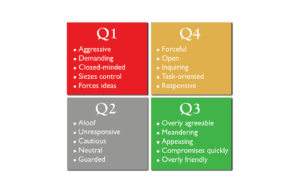
Too Much Socializing in the Workplace – Strategies for Handling (Actionable)
Too Much Socializing in the Workplace
Have you ever had an employee who spends so much time socializing that he doesn’t get his work done? How do you handle this situation? Should you avoid assigning him work that is more sociable? Do you pair him with a teammate who is more task-oriented? Or something else? We’ll explore 3 approaches to too much socializing in the workplace. You’ll learn which is best, so you can be optimally effective in dealing with oversocializers when you encounter them.
See Career Builder’s survey results of the 10 biggest office productivity killers. Oversocializing is linked to many of these.
The Situation
You are head of the marketing department for your tech company. As part of your effort to roll out a new product, the company is participating in a big outdoor Tech-Expo event held annually at a local park.
Each participating company is responsible for providing its own tent and exhibit fixtures. You ask Kevin, a member of your team, to contact tent providers from a list of suppliers and rent what is needed.
Assigning a Task
Kevin is an amiable employee who gets along with everyone. When you decided he would be right for this part of the project, you went over the list with him and encouraged him to get on it. A week later, when you asked Kevin for a progress report, he admitted that he hasn’t done it yet.
Overly Friendly
Yes, he talked to the event people and got the list of suppliers. No, he hasn’t contacted any of them yet. Kevin tells you that Camila, another employee in your department, asked him for help on another part of the project. He has also been busy helping orient two new employees who he checks on quite a bit. Besides, he points out, the deadline for the tent project is still a month away.
You say that you wanted to plug his figures into your costs to see how the budget is affected. And what if the tents are all taken? You want this nailed down.
Social Butterfly Club
You have observed that Kevin tends to be the office social butterfly. He often socializes with coworkers. He volunteers on the fun committee planning office events, which is great. But is Kevin’s socializing to the detriment of getting his work done?
When you considered Kevin, you didn’t allow for his Q3 gregarious and meandering behavior to slow down the process. If you could start over with Kevin, what would be the most effective Q4 collaborative skills to use to address too much socializing in the workplace?
Your Choices:
No, please try again.
No, please try again.
What To Do When Coworkers Are Not Doing Their Job
When coworkers socialize so much that they are not getting their work done on time, how do you handle?
Pair The Socialite with a More Task Oriented Employee to Get the Job Done
From a resource standpoint, this is not a two-person task. Moreover, Kevin’s overly sociable tendencies are apt to work against this solution. Look how he took his eyes off the goal to help Camila.
Working with other people can be a positive motivator for Q3 behavior, but in this case, pairing two work friends is asking for trouble. Answer A is not an optimal approach to too much socializing in the workplace. Answer C is a better remedy.
Don’t Assign a Sociable Task to a Gregarious Employee
You may think it is better to keep Kevin away from dealing with vendors–Option B. He might get bogged down in socializing. However, if a tight action plan is generated, it can keep Kevin on task.
In general, it’s good motivation to play to the needs of Q3 sociability. Employees who enjoy people are usually good representatives of the company. Assignments that include dealing with people as part of completing the task are win-win. But won’t Kevin spend an inordinate amount of time with the vendors?
If you have employees similar to Kevin, the key to dealing with over socializing is to generate a detailed plan with frequent check-backs to help them maintain focus. See Answer C.
Work Out an Action Plan with Timelines. Follow up.
Every employee should be viewed as unique. Someone with Q1 independent or Q2 avoidance tendencies might resent your close attention to the specifics of carrying out this fairly simple assignment. However, employees with Q3 overly sociable behavior can be easily distracted from achieving a goal.
In this case, Kevin didn’t want to disappoint Camila by turning down her request for assistance. Developing a detailed action plan with a timeline will remind him of his responsibility to the task. In fact, Q3 often appreciates that reminder.
Meanwhile, it’s important that you not simply dictate an action plan (unless it’s a crisis situation). Direct reports will be much more invested in an assignment if they are central in planning the steps to completion. Get their buy-in by asking them how they will proceed. Then, when you both agree on the plan, hold them to it. You now have a good recipe for what to do when coworkers are not doing their job due to too much socializing in the workplace.
Moving On from Too Much Socializing in the Workplace
In honor of you mastering what to do when employees aren’t getting their work done from too much socializing at work, I think it’s time to throw you an office party!
But before we do, some more learning is in order. Check out our Learning for Leaders page where you’ll find more leadership tips, white papers, … There is even a Do You Work for a Difficult Person widget that will give you actionable advice to more successfully manage your situation.
Ready to progress from learning about leadership to becoming a Q4 leader? Our leadership development page has resources to assist you: our Q4 leadership workshop, individualized coaching, 360 feedback, and more.
Lastly, we invite you to subscribe to our newsletter to keep up to date on new leadership learnings and upcoming events.


